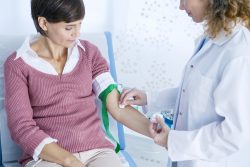 Researchers at the Indiana University School of Medicine have developed a new test that will objectively measure pain biomarkers in blood. This test is important in that it could help medical professionals treat patients more effectively with precision medicine and help slow down the use of opioids.
Researchers at the Indiana University School of Medicine have developed a new test that will objectively measure pain biomarkers in blood. This test is important in that it could help medical professionals treat patients more effectively with precision medicine and help slow down the use of opioids.
The team tracked hundreds of study participants at the Richard L. Roudebush VA Medical Center in Indianapolis to identify biomarkers in the participants blood. The blood test which is the first of its kind, would give physicians much more accuracy in treating pain. In addition it would help them determine the best long term look at a patient’s medical future.
The prototype for the blood test can objectively show doctors if their patient is in pain and how severe that pain is for them. Pain is a subjective sensation so it is very important to have an objective measure. Until this study, physicians could only rely on their patients self reporting or on their own clinical impression of the patient’s pain level.
The research team looked at biomarkers found in the participants blood which in this case are molecules that reflect the severity of a disease. From there a doctor can assess the severity of pain and provide treatment in a quantifiable and objective manner. With the current opioid epidemic, the team believes there has never been a more critical time to administer drugs in a responsible manner.
The opioid epidemic has occurred due to the addictive medications that have been over prescribed because there has been no objective measure of whether someone is actually in pain and if they are, how severe that pain is. The thought has been, if the patient says there are experiencing pain then prescribe it. The new test recently developed allows doctors to treat people’s pain in a precise manner.
The blood test also helps doctors match a person’s biomarkers in their blood with a variety of potential options for treatment. The researchers use a prescription database to match pain biomarkers with a profile of natural compounds and drugs which have been cataloged in the database.
A person’s blood biomarkers are similar to a fingerprint and they can be matched against the database to see which compound could normalize the signature. Hopefully the best treatment is identified as a non opioid drug or compound. For instance, there are some compounds that have been used for years to treat things other than pain. These might pair best with a person’s blood biomarkers for pain treatment.
The goal in any area of of medicine is to match a patient to the right drug for any health condition and to do so with very little harm. In the area of pain management through the widespread use of opioids, precision health such as the biomarker blood test could now possibly eliminate or reduce opioid use.
Study experts have also discovered that biomarkers not only match with non addictive drugs which treat pain, but can also assist in predicting when someone might experience pain sometime in the future. This helps them determine if a patient is showing chronic, long term pain which could result in emergency room visits in their future.
The team first sought to find markers for pain that are universal and they achieved that. However, based on their data there are some markers which will work better for men and some that work better for women. And there could be markers that will work better for headaches or fibromyalgia and other conditions and diseases.
Moving forward the research team hopes to secure funding to continue and hopefully accelerate their studies. Their hopes are to be able to personalize the approach even more and also move towards a clinical application. The team’s leader notes that is has been a goal for many researchers to find biomarkers for pain. The work the group has done could now have a significant impact on how physicians around the globe treat pain in the future.
To view the original scientific study click here: Towards precision medicine for pain: diagnostic biomarkers and repurposed drugs.





